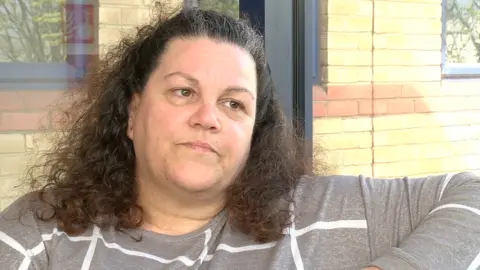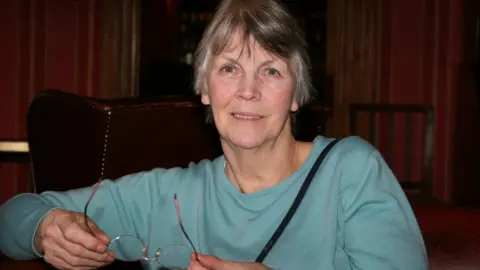Families 'asked to pay care home top-up fees by councils'
 BBC
BBCOlder people's dignity risks being compromised as councils opt for lower-cost care homes, a charity has said.
Age Cymru said families were asked to accept arrangements which did not meet complex needs, despite regulations.
It said its helpline had heard of loved ones being asked to pay top-up fees to secure appropriate placements when councils should meet that cost.
The Welsh Local Government Association said councils were committed to placing people "in the most appropriate venue".

You might be interested in these stories as well:

People with more than £40,000 of savings or other assets often have to pay the full cost of residential care in Wales.
Even for those eligible for local authority-funded support, so-called top up fees from third parties - often family members - are not against the rules.
Councils can ask for additional payments if a family have a preference for a more expensive home, but only if it had already offered a place which genuinely meets an individual's assessed needs.
Age Cymru said councils were sometimes offering inappropriate placements before suggesting families might pay towards a home which meets their relative's needs.

Interim chief executive Victoria Lloyd said local authorities were not always clear about fee arrangements, leading to some families facing a very large and unexpected bill.
In 2017, Age Cymru's information and advice line received 87 calls on paying for residential care, including 77 about top-up fees and more than 1,000 on residential care in general.
Ms Lloyd said: "We hear where people are struggling to pay - we've had instances where third parties living on benefits are being asked to pay a top-up fee for their relatives, which is just not affordable, and that's when they come to us.
"We've got an ageing population as we're living longer we're not necessarily living in good health for longer so we're having longer periods living in poor health and all of that puts pressure on our services.
"But that doesn't meet individual rights and dignity can be ignored."
The charity said despite changes in the law and updated regulations, some families felt inappropriate placements had led to an already vulnerable older person deteriorating even further.
Ms Lloyd added: "Unless this is looked at more closely, were going to have more people in the wrong placements, we'll be compromising the dignity of more older people and their families and that's not good for quality of life.
"As a society it's not the way we want to treat the older generation."
A WLGA spokeswoman said a lack of suitable placements meant people were sometimes placed in temporary accommodation while a long-term space was identified.
She acknowledged this was not ideal and said "some people and their families are not always happy with the placement made".
"In such circumstances we would wish to work with the family to resolve their concerns but there is not always a wide choice of placements available locally and difficult decisions have to be made."

 Patricia Cassidy
Patricia Cassidy'There's absolutely no way I can afford that'
"It's heartbreaking, absolutely heartbreaking. I did cry a lot. You keep coming up against brick walls."
Trish Cassidy said she was asked to pay £500 a week to ensure her mother, Ann Moir, got the care she needed.
Ms Moir was diagnosed with dementia and, as her condition gradually worsened, she was found wandering the streets without a coat.
Ms Cassidy made an emergency referral to Cardiff social services, which promptly found her a temporary placement in a care home.
Three weeks later, Ms Moir, 77, was assessed as having complex dietary and medical requirements, as well as being in need of stimulating actives because of her intelligence.
"Mum needed activities to continue to stimulate her, because without it she'd sit there and slump, think internally and not interact with other people."
After visiting care homes the council said would be suitable, Ms Cassidy said it was clear the only place which was able to meet her mother's needs was one outside the authority's budget.
She said the council suggested she would have to pay £500 a week before her mother could move in.
"I said there's absolutely no way I can afford that. I only wanted the best for mum - not a room with a view or anything like that, just somewhere that met her needs."
'Don't accept it'
After 11 weeks of phone calls and emails, the council eventually agreed to meet the costs, but Ms Moir had deteriorated in her respite home and lost a lot of weight.
She would often be found slumped in a chair without the kind of stimulation her care plan suggested was important to her wellbeing.
"Mum was the only person there who could talk and walk, so she was very limited in terms of interaction with other people.
"After a few weeks she'd already forgotten how to use a door handle, which was very sad because before then she was very independent."
Ms Cassidy said her mother was doing much better in her new home, but is concerned for other families being asked to pay fees they cannot afford.
"If you feel it doesn't meet their needs, don't accept it, and explain why," she said.
"One thing I never saw until very recently is mum's needs assessment. Knowing what they considered her needs were… you've got something to challenge them on."
BBC Wales approached Cardiff council for a statement on Ms Moir's care.
Cabinet member for social care, Susan Elsmore, said: "Although I cannot comment on individual cases, if individuals or families have any concerns, I would encourage them to contact us so that we can look into such matters.
"Broadly speaking we have seen satisfaction levels for Cardiff social services increase at a time when, like all councils, social services budgets are coming under severe pressure.
"By continuing to develop new ways of working we will be able to deliver services that are highly rated overall, at the same time as providing value for money to taxpayers."
